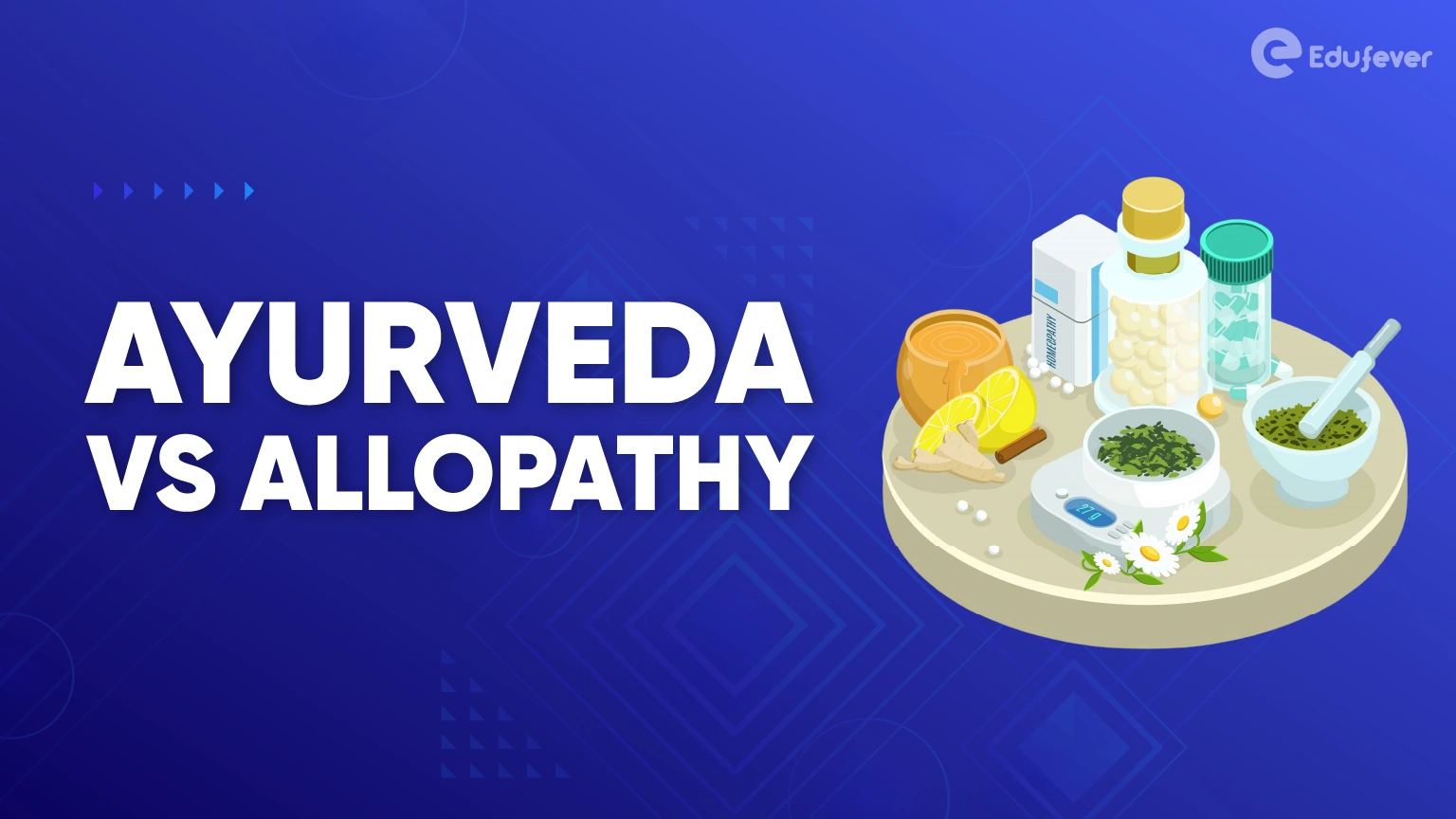Ayurveda Vs Allopathy: For centuries, Ayurveda has been used as the primary medicinal system till the concept of allopathy was introduced by the West. However, it underwent a period of decline during the British era as Western medical education became dominant. Ayurveda became a second-class option used primarily by traditional spiritual practitioners and the poor. However it gained ground after independence, and new schools started to be established. Some sections of people prefer allopathy, as it is easily available, provides instant pain relief and is scientifically tested.
| NEET UG Counselling Guide 2025 | |
|---|---|
| State-wise MBBS/BDS Counselling Guide eBook 2025 | 📥 Download |
| MCC NEET UG Counselling Guide eBook 2025 | 📥 Download |
| AACCC AYUSH NEET Counselling Guide eBook 2025 | 📥 Download |
While Ayurveda can naturally help cure diseases while taking into account the mental and physical state of the patient, Allopathy treatments have been tested and have Scientific backing. When both can help meet the end goal, choosing one would depend on the individual’s choices and preferences. Modern medicine is experimental and, therefore, capable of advancement in diagnosis and treatment; Traditional medicine is a closed system and non-experimental. It is, Therefore, incapable of improvement within the traditional framework.
[Page Index]
What is Ayurveda?
Ayurveda is a medicine based on the belief that our health depends on a balance between the body, mind, and spirit. Its main goal is to help people stay healthy, not to cure diseases. However, some treatments Ayurveda practitioners may use are specifically designed to help people with certain health problems.
Ayurvedic therapies include herbal medicine, special diets, meditation, yoga, massage, laxatives, enemas, and medical oils. These therapies are based on complex herbal compounds, minerals, and metal substances.

What is Allopathy?
Samuel Hahnemann created the term “Allopathy.” It involves treating diseases by using substances that cause different symptoms in healthy people than the disease itself.
Allopathic physicians, also known as medical doctors, focus on maintaining health through prevention and acute care. They can specialize in various fields and may work in research or teaching.
Medical doctors have an MD degree and take care of health through prevention and treatment. They can specialize in different areas and pursue careers in research or education.
Types of Modern Medicine
- Pain relievers (acetaminophen, aspirin, and ibuprofen)
- Muscle relaxers.
- Cough suppressants.
- Sore throat medications.
- Antibiotic ointments.

Benefits of Ayurveda
Ayurvedic medicine offers many benefits for individuals seeking to restore balance and harmony between the body, mind, and spirit. It is a holistic system of healing that considers the individual’s physical, emotional, and spiritual needs.
- Improved overall health and well-being: By restoring balance and harmony between the body, mind, and spirit, Ayurvedic medicine can help to improve overall health and well-being.
- Relief from symptoms of chronic illnesses: By addressing the root cause, Ayurvedic medicine can help reduce symptoms and improve quality of life.
Benefits of Allopathy Medicine
- Contemporary Technology: Doctors can access the latest technology to diagnose and treat illnesses and injuries.
- Proficient Doctors: Allopathic doctors are highly skilled physicians who can treat illnesses and injuries and perform tests to help improve the quality of life of their patients.
- Patient Protection: All allopathic doctors and nurses are licensed, ensuring patients have legal protection and only receive the best treatment.
- Research and Development: Huge investment goes into research and development. New treatments and medicines are developed daily.
- Easy Availability: There are medical facilities in every town. There’s always somewhere a patient can go to seek medical help.

Ayurveda Vs Allopathy: Which is better?
Ayurveda has been in India for more than 3000 years. Earlier, people practiced Ayurveda as the primary medicinal system. It is also known as alternative medicine, where homemade remedies are primarily used as medicine. Ayurveda not only deals with the body but with spirit and mind. The main reason why people are shifting their preference to Ayurveda is that, to relieve themselves from immediate pain, people tend to take allopathy medications which can damage the human body in the long run. Allopathy medicine may pacify one disease but tends to increase the occurrence of other diseases.
Allopathy is the new contemporary medicinal system introduced by the West. It provides instant pain relief, whereas ayurvedic medicine may take some time to effect. With allopathy, physicians have the latest technology to run various tests. On the other hand, Ayurveda is a traditional medical system, and diseases can be cured through therapies. Many modern medications are derived from plants alluded to in the ayurvedic texts, like Rauwolfia Serpentine, which is used to treat headaches, anxiety, and snakebites. Its derivative is used in treating blood pressure nowadays.
Difference between Ayurveda Vs Allopathy
There is a difference between Ayurveda and allopathy medicines. Ayurveda heals diseases from the root but does not provide instant relief, whereas Allopathy does provide instant relief but does have side effects. Below we have mentioned some of the differences between Ayurveda and Allopathy.
| Basis | Ayurveda | Allopathy |
| Form | Ayurveda is an ancient form of alternative medicine course that involves the treatment of diseases with the help of herbs, vegetables, and minerals, followed by wholesome betterment of the human body. | Allopathy involves curing ailments with clinically tested drugs for better results. |
| Acceptance | Ayurveda does not accept or include Allopathic treatments. | Allopathy can easily accept Ayurvedic forms of medicine if they pass all required clinical trials performed by professionals. |
| Side Effects | Ayurvedic medicine has no side effects. Depending on the body, some herbs can have side effects if taken in high doses for a long period. | Allopathic medication does have side effects. |
| Effectiveness in an Emergency | Ayurvedic medicine, though natural, takes a bit longer to prove its worth and can rarely be used in emergencies. | Allopathic medication is highly effective in an emergency as it gives faster results. |
Advantages of Ayurveda over Allopathy
- Composed of Natural Elements: Allopathy medicine is composed of chemicals, whereas ayurveda is composed naturally of herbs, plants etc., that cause no harm. It is entirely pure and made from vegetables, fruits, and spices.
- Individual treatment: Allopathy treats people suffering from different diseases the same way, whereas Ayurveda treats them differently according to the people’s requirements.
- Economical: Ayurvedic medicine is safe and less expensive than allopathic medicine as it provides long-term relief and cures symptoms. On the other hand, allopathic medicine is costlier and medically composed, i.e., made from chemicals.
Effective Ayurvedic Alternative to Allopathic Medicines
- Sudarsana Tablet for Fever- Alternative to Crocin: It is one of the most popular allopathic medicines used for migraines, headaches, mild fevers, and various other minor concerns.
- Alsactil -Alternative to Antacids: It is a proprietary formulation that can provide relief from hyperacidity and flatulence. This unique formulation can help protect gastric health and improve appetite.
- Histantin Tablet for Allergy- Alternative to Allegra: It is an alternative medicine for Allegra. It can help relieve allergic symptoms from roots. It can help to purify the blood, relieve respiratory concerns, boost your immunity and help manage skincare concerns.
- Tussnil Syrup for Dry Cough- Alternative to Benadry: It is a syrup for dry cough and can be an effective alternative.
- Anu Thailam Nasal Drops- Alternative to Affrin: It is an ayurvedic medicated oil that can help relieve many respiratory concerns. From nasal congestion to blocked nose and sinuses.

Side Effects of Ayurveda and Allopathy
Medicinal treatment cannot guarantee side effects. There are some side effects while taking a medicine. Even Ayurveda has some side effects if high doses are consumed for a long period. We have compiled some of the common side effects of Ayurveda and Allopathy medicine. Let’s take a look.
| Side effect of Ayurveda Medicine | Side Effects of Allopathy Medicine |
| Constipation | Diarrhoea and abdominal discomfort, especially in high doses |
| Diarrhoea | Stomach upset |
| Headache and Insomnia | headaches, nausea and hiccups |
| Skin rash or dermatitis | Stomach pain |
| Dizziness and Drowsiness | an allergic rash (when applied to the skin) |
| Dry mouth and Nausea | vomiting |
Conclusion: Ayurveda vs Allopathy
Ayurveda and Allopathy offer distinct approaches to medicine:
- Ayurveda is an ancient Indian system focusing on balancing the body, mind, and spirit using natural remedies like herbs, diet, and therapies. It emphasizes holistic health and can address chronic conditions by treating root causes. However, it takes time to show results and is less effective in emergencies.
- Allopathy is a modern, scientifically tested system that provides quick relief through drugs and advanced technology. It’s effective in acute situations and emergencies but may come with side effects and focuses more on symptom management than holistic wellness.
Both have their advantages and disadvantages Choosing between Ayurveda and Allopathy depends on individual health needs, preferences, and the nature of the condition being treated.



